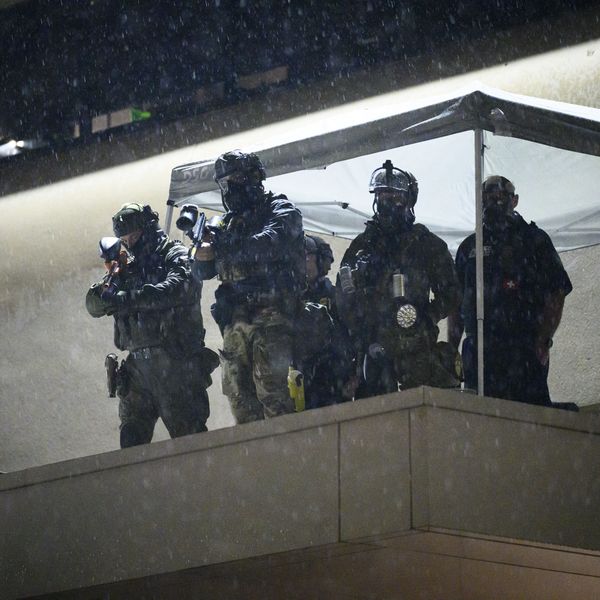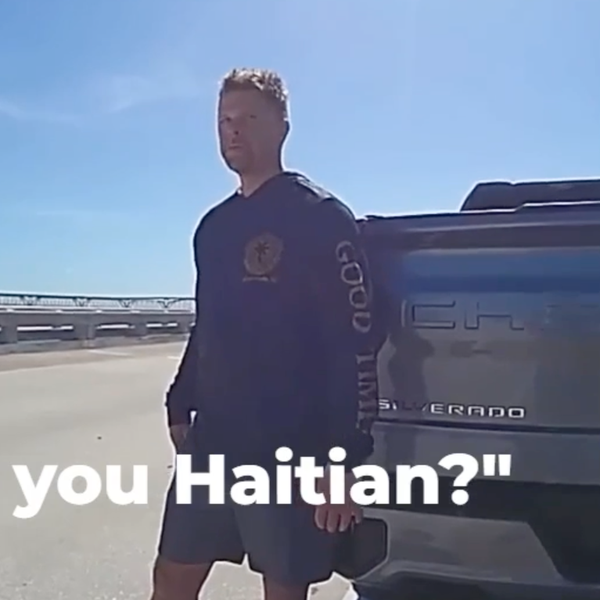While U.S. President Joe Biden echoed human rights defenders on Monday by calling Russian President Vladimir Putin "a war criminal" in response to what Ukrainian officials described as a "deliberate massacre" in Bucha, the American leader's remarks also highlighted a refusal by his government to acknowledge or face consequences for the United States' crimes abroad.
Recalling his remarks from mid-March, Biden told reporters outside the White House on Monday that "you may remember I got criticized for calling Putin a war criminal. Well, the truth of the matter--you saw what happened in Bucha... He is a war criminal."
"But we have to gather the information, we have to continue to provide Ukraine with the weapons they need to continue the fight, and we have to get all the detail so this can be an actual--have a wartime trial," Biden added. "This guy is brutal. And what's happening in Bucha is outrageous, and everyone's seen it."
While signaling his support for a trial, Biden also said that "I'm seeking more sanctions." Asked for further details on such economic measures, he responded, "I'll let you know."
The International Criminal Court (ICC) launched an investigation into the situation in Ukraine shortly after Russian forces invaded in late February. Over the past six weeks, war crime allegations--largely against Russian invaders--have continued to mount and have been met with global outrage.
The Intercept's Jeremy Scahill wrote in March that "while many statements from Western leaders may be accurate regarding the nature of Russia's actions, the U.S. and other NATO nations are in a dubious position to take a moralistic stance in condemning Russia. That they do so with zero recognition of their own hypocrisy, provocative actions, and history of unbridled militarism--particularly in the case of the U.S.--is deeply problematic."
"Vladimir Putin and the Russian officials responsible for this invasion of Ukraine should face justice," he continued. "Once the evidence has been gathered, every war crime should be investigated, indictments issued, and prosecutions undertaken. The obvious venue for this would be before the International Criminal Court. Yet here is an inconvenient fact: The U.S. has refused to ratify the Rome Statute, which established the ICC."
Recalling that in 2002, then-President George W. Bush "signed legislation that authorizes the U.S. to literally conduct military operations in The Hague to liberate any American personnel brought to trial for war crimes," Scahill wrote that "it is indefensible that the U.S. has established a precedent that powerful nations need not be held accountable for their crimes. It is a precedent that Russia knows well, exploits regularly, and will certainly use again and again."
The journalist has been far from alone in recently calling out previous U.S. actions against the court. In a March opinion piece for the Chicago Tribune, Sara L. Ochs, a law professor at the University of Louisville, pointed out that while the ICC is generally prevented from probing crimes committed by nonmembers, there have been exceptions:
The ICC exercised this jurisdiction over a nonmember in 2020, when it authorized an investigation into atrocities committed in Afghanistan. While Afghanistan is a member of the ICC, the investigation encompassed war crimes and crimes against humanity committed by the Taliban and affiliated terrorist groups, the Afghan National Security Forces, and--notably--U.S. military and intelligence personnel.
The Afghanistan investigation struck a nerve with the U.S. government, which had been an early supporter of the ICC at the time of its creation, but which declined to join the court in part due to the ICC's ability to exercise jurisdiction over nonmembers.
In response to the ICC's investigation into Afghanistan, then-President Donald Trump refused to recognize the court's authority and issued an executive order imposing sanctions on ICC personnel involved in the Afghanistan investigation, ironically pursuant to the same authority by which the U.S. now sanctions Russia for its actions in Ukraine.
Though "Biden has since revoked Trump's ICC sanctions, he has maintained U.S. objections to the court. But now that Russia is the superpower in the ICC's hot seat, it's time for Biden to reconsider," Ochs argued. "The ICC may be the one way to hold Putin individually accountable for Russian war crimes on Ukrainian soil."
While Biden is under growing pressure to reform his administration's position on the court given current conditions, some also charge--as Joel Mathis wrote for The Week on Monday--that the United States still "can't provide much leadership in the matter of Russia's alleged war crimes against Ukraine."
Pointing to recent calls from members of the Biden administration for accountability for any crimes in Ukraine, Mathis made the case that the U.S. "is ill-positioned to help bring about that justice--not without cloaking itself in immense hypocrisy." Like Scahill and Ochs, he emphasized that in recent decades, "the U.S. has used intimidation, sanctions, and the heft of its hegemonic power to guarantee that none of its soldiers or officials will ever be brought before the court, no matter how deserving they might be."
"There has been plenty to investigate," he noted. "The ICC's existence has coincided almost precisely with America's 'forever war' era. During the last 20 years, the U.S. has launched an unprovoked war of aggression against Iraq; tortured prisoners at Abu Ghraib, Guantanamo Bay, and black sites around Europe; bombed civilians in Syria; and committed countless other acts worthy of scrutiny. Accountability has been rare. Gina Haspel ordered the destruction of evidence of torture and then was named CIA director. Others received pardons and were transformed into heroes for the Fox News set."
As for Russia's alleged crimes, Human Rights Watch's Europe and Central Asia director, Hugh Williamson, said Sunday that "the cases we documented amount to unspeakable, deliberate cruelty and violence against Ukrainian civilians."
"Rape, murder, and other violent acts against people in the Russian forces' custody should be investigated as war crimes," Williamson added, referencing allegations from the Chernihiv, Kharkiv, and Kyiv areas.
In Bucha, a suburb of the Ukrainian capital Kyiv, "we found mass graves filled with civilians," Serhiy Nykyforov, a spokesperson for Ukrainian President Volodymyr Zelenskyy, said Sunday.
"We found people with their hands and with their legs tied up," he continued, "and [with] bullet holes at the back of their heads--so they were clearly civilians and they were executed. We found half-burned bodies as if somebody tried to hide their crimes."
"I have to be very careful with my... wording, but it looks exactly like war crimes," Nykyforov told the BBC. He also acknowledged that Human Rights Watch is investigating and that the ICC "is very dedicated to pursuing all the war criminals."
Noting allegations in Bucha and beyond, Ned Price, a spokesperson for U.S. State Department, said Monday that "we have previously assessed that members of Russia's forces have committed war crimes. The images we have seen and reports we have heard suggest the atrocities are not the act of a rogue soldier; they are part of a broader, troubling campaign."
"Those responsible for atrocities must be held accountable--as must those who ordered them," he said. "They cannot and will not act with impunity. We are tracking and documenting atrocities and sharing information with institutions working to hold responsible those accountable."
"We are pursuing accountability, supporting international accountability mechanisms and NGOs documenting human rights abuses," Price added, explaining that the U.S. is backing a multi-national team of international prosecutors to aid the Ukrainian prosecutor general.
Scahill noted Friday that "the war in Ukraine is simultaneously a war of aggression being waged by Putin and part of a larger geopolitical battle between the U.S., NATO, and Russia."
"It should not be assumed that the strategies and actions being employed by Washington and its allies in their proxy war against Moscow will always be in the best interest of Ukraine or its people," he wrote. "Likewise, Ukraine's calls for military support and action from the West--however justifiable and sincere they are--may not be in the best interest of the rest of the world, particularly if they increase the likelihood of nuclear war or World War III."
"The overt war in Ukraine will have to end at the negotiating table," he concluded. "But the proxy war is escalating and will have consequences that extend far beyond the current battlefield."


